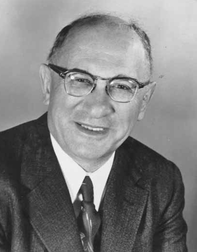The Origin of Social Security
While the concept of social security was not an American idea, the term “social security” was first coined by an American, Abraham “Abe” Epstein, a national leader in the social welfare movement in the first half of the 20th century.
While the concept of social security was not an American idea, the term “social security” was first coined by an American, Abraham “Abe” Epstein, a national leader in the social welfare movement in the first half of the 20th century.
Abe Epstein was research director of the Pennyslvania Commission on Old Age Pensions from 1918 to 1927. In 1923 he promoted the adoption of an old-age assistance law, but when that law was declared unconstitutional by the State Supreme Court, he set up a national organization to boost public support for State old-age pension programs and other social legislation. His companion, Emil Frankel, had told him during a walk in Harrisburg that he would not use the word “pension”, because “at that moment the word had a connotation of politically radical action which challenged the established order” (Frankel 1949). Instead he proposed to use the word “security”. .: In 1927 the American Association for Old Age Security was founded. In 1933 the name of the organization was changed by Abe Epstein to the American Association for Social Security.

Abe Epstein
“I insisted on the term ‘social security’ because by that time I had a clear conception of the differences which lay between the concept of social insurance as worked out by Bismarck in Germany and the conception of social protection as elaborated in England. I definitely did not want ‘social insurance’ because this would give it the German twist of the actuarial insurance concept in terms of compulsory savings which do not justify governmental contributions. I did not want ‘economic security because what I hoped for was not only a form of security for the workers as such but that type of security which would, at the same time, promote the welfare of society as a whole as I was convinced that no improvement in the conditions of labor can come except as the security of the people as a whole is advanced.” Epstein 1941.
Franklin Delano Roosevelt initially used the term “economic security”. He used it in 1934 when he formed the Committee on Economic Security; and he used it again in1935, for his message to Congress urging enactment of the Committee’s recommendations. Epstein believed he did so in a deliberate attempt to disassociate the governmental initiative from his private organization. However, the Social Security Act of 1935 created the Social Security program, establishing a basic right to a pension in old age, as well as insurance against unemployment, funded by payroll taxes.

Social security
The term began an international career, especially when the Philadelphia Charter, the declaration of the aims and principles of the International Labour Organisation (ILO), which was adopted on May 10th 1944 by the International Labor Conference, further propagated the term “social security”. Paragraph 6 of the Philadelphia Charter specifies that the ILO should further “among the nations of the world” the “extension of social security measures to provide a basic income to all in need of such protection”. Three of the seven recommendations adopted by the conference, and four additional resolutions, dealt specifically with social security proposals. After the liberation, countries such as Belgium (1944) and France (1945), enacted their own social security legislation: la sécurité sociale.
After the liberation, countries such as Belgium (1944) and France (1945), enacted their own social security legislation: la sécurité sociale (shortened to “la Sécu” for friends).
Nowadays, we prefer to refer to social protection, which includes social security (defined as social insurance) and social assistance (needs-based and/or means-tested benefits and services). However, different definitions and visions exist on what social protection could/should include.






